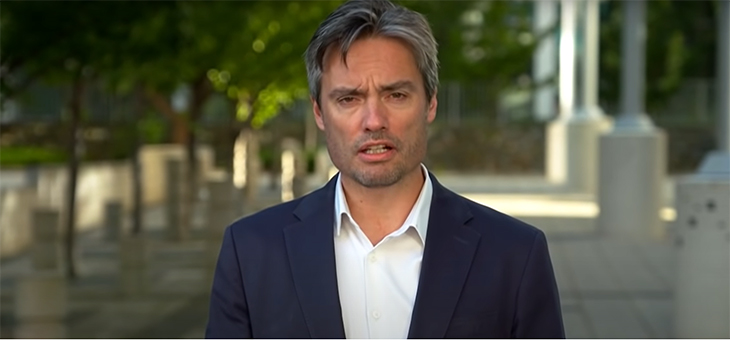While the world waits with bated breath for details on the new Omicron variant of COVID-19, a leading Australian doctor has suggested it could be exactly what is required for the virus to move from a pandemic to endemic.
The early impressions of the Omicron variant show that vaccines are still effective against it, but that it has much milder symptoms than the Delta variant, while being just as contagious.
Professor Nick Coatsworth of the Australian National University (ANU) told Channel Nine’s Today show it could be the case that Australia attempts to welcome the new variant into the community.
Read: Higher Medicare levy for those who refuse a vaccine?
Prof. Coatsworth, the former deputy chief medical officer of Australia, said that early reports from southern Africa had suggested the variant had spread faster but with much milder symptoms in vaccinated patients.
“If this is milder than Delta, you actually want it to spread within your community,” Prof. Coatsworth said.
“You want it to out compete Delta and become the predominant circulating virus.
“It could be that we want Omicron to spread around the world as quickly as possible.”
Read: New Omicron variant hits Australian shores
At the moment, however, the government is being cautious with the new strain of the virus. Australia has closed its borders to nine southern African countries and has paused the border reopening for skilled worker vis holders and international students.
The World Health Organization (WHO) has criticised Australia and other countries for closing their borders too quickly, warning it could be counterproductive in future.
WHO spokeswoman Margaret Harris told Sky News on Tuesday it could make countries less willing to share information.
“We don’t like to see that level of restriction because that really punishes (those countries),” Ms Harris said.
“It makes other countries less comfortable about being so helpful to the rest of the world.”
Prof. Coatsworth said more data was needed but, based on the information available so far, he was “probably a little less worried”.
“There’s a lot we need to find out and I don’t think there’s any strong evidence at the moment – apart from the fact that it’s got 30 mutations – that those mutations are going to have the sort of negative effect,” Prof. Coatsworth said.
Read: Your reaction to anti-vaxxers changing tactics
“I definitely don’t think we should be waking up to any sort of panic. This thing is only 72- hours old. There are too few cases at the moment.
“There’s three elements to a variant of concern. It can transmit more quickly, it can be more deadly or it can evade the vaccine.
“It’s the first one. The speed at which it’s spreading in South Africa is what makes it a variant of concern.
“The South African ministry of health said most cases have been mild.”
Australia’s chief health officer Professor Paul Kelly said that the five case of the Omicron variant in Australia were all diagnosed quickly and were all currently in quarantine.
Prof. Kelly said that all of the five cases in Australia had direct links to southern Africa and were all double vaccinated and had very mild, or in some cases no disease.
NSW Health has requested that anyone who arrived in NSW on flight QR908 on 25 November with the two confirmed Omicron cases be tested immediately, regardless of previous test results and vaccination status and isolate until a negative test is received.
CSIRO health director Dr Rob Grenfell told Perth radio station 6PR that viruses tended to become less sever over time, and this could be playing out with the Omicron variant, which is quickly becoming more infectious than Delta.
“We certainly are holding our breath until we see how this virus performs against the antibodies that we’ve generated in vaccinated people,” Dr Grenfell said.
“What we saw with Delta for instance, Delta was much more infectious than Alpha and became the dominant strain, and it may be that Omicron is going to do the same to Delta over the next few months.”
Do you think the Omicron variant of the COVID virus could finally bring about the end of the pandemic? Why not share your thoughts in the comments section below?
If you enjoy our content, don’t keep it to yourself. Share our free eNews with your friends and encourage them to sign up.

